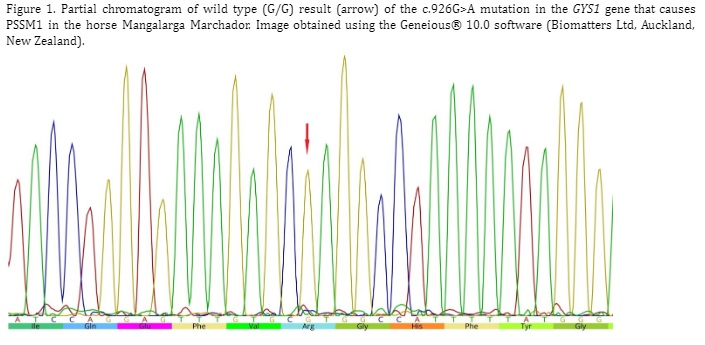Study of the mutation causing type 1 polysaccharide storage myopathy in a Mangalarga Marchador population used in breeding programs
DOI:
https://doi.org/10.21708/avb.2023.17.1.11422Resumo
The Mangalarga Marchador (MM) breed, which originated in Brazil, constitutes the largest number of horses in the country. The animals are versatile and used in several sports as a result of major investments made for the genetic improvement of the breed. In recent decades, advances in molecular techniques have enabled the identification of genetic diseases in horses. Conducting molecular tests and determining the occurrence of mutations are fundamental for the early identification and prevention of abnormalities. Among the known genetic diseases that occur in horses, the c.926G>A mutation in the GYS1 gene that causes type 1 polysaccharide storage myopathy (PSSM1) stands out, because it has been identified in several breeds of horses. Although myopathy is common in MM horses, the occurrence of the c.926G>A mutation in the GYS1 gene has not yet been evaluated. The lack of knowledge about the possible presence of PSSM1 averts the adoption of control measures to prevent the spread of the disease in MM horses. Therefore, the aim of this study was to verify the occurrence of the mutation that causes PSSM1 in MM horses used in commercial breeding programs. Blood DNA was extracted and the region of the GYS1 gene containing the mutation was amplified and sequenced. No mutation in the GYS1 gene was found in the evaluated samples. Histological studies of myopathies in MM horses must be carried out to establish the causes. In addition, if there is a genetic pattern of occurrence, molecular studies must be carried out.
Downloads

Downloads
Publicado
Edição
Seção
Licença
Copyright (c) 2023 Acta Veterinaria Brasilica

Este trabalho está licenciado sob uma licença Creative Commons Attribution 4.0 International License.
Autores que publicam na Acta Veterinaria Brasilica concordam com os seguintes termos: a) Autores mantém os direitos autorais e concedem à revista o direito de primeira publicação, com o trabalho simultaneamente licenciado sob a Licença Creative Commons Attribution que permite o compartilhamento do trabalho com reconhecimento da autoria e publicação inicial nesta revista. b) Autores têm autorização para assumir contratos adicionais separadamente, para distribuição não-exclusiva da versão do trabalho publicada nesta revista (ex.: publicar em repositório institucional ou como capítulo de livro), com reconhecimento de autoria e publicação inicial nesta revista. c) Autores têm permissão e são estimulados a publicar e distribuir seu trabalho online (ex.: em repositórios institucionais ou na sua página pessoal) a qualquer ponto antes ou durante o processo editorial, já que isso pode gerar alterações produtivas, bem como aumentar o impacto e a citação do trabalho publicado (Veja O Efeito do Acesso Livre).


 Esta obra está licenciada com uma Licença
Esta obra está licenciada com uma Licença 